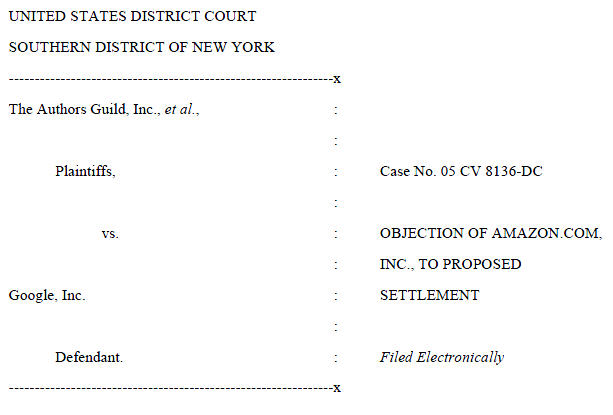Amazon knocks Google Book Settlement; Opposition (and some support) lines up

Amazon panned Google's book settlement with the Author's Guild saying that the deal "restrains competition" and "usurps the role of Congress in legislating solutions" as copyright and new technologies collide.

Also see: A spirited defense of the Google Book Search settlement
Open Book Alliances opens up assault on Google’s book settlement
Meanwhile, the Open Book Alliance, which counts Amazon, Microsoft and Yahoo as members, and other groups have rallied against it. A hearing is scheduled for Oct. 7 to hear objections to the Google pact with authors and publishers.
In its filing, Amazon said it would show up to the Oct. 7 hearing to voice its objection. The e-tailer said:
Amazon also brings a unique perspective to this Court because it has engaged in a book scanning project very similar to Google’s, with one major distinction: As to books still subject to copyright protection, Amazon has only scanned those for which it could obtain permission to do so from the copyright holder. Amazon’s scanning project has to date resulted in the lawful scanning of over 1 million English-language works and 3 million books in total.
And then Amazon gets to the nut of its argument:
The settlement proposed by the parties to this case should not be approved. It is unfair to authors, publishers, and others whose works would be the subject of a compulsory license for the life of the copyright in favor of Google and the newly created Book Rights Registry. It is anticompetitive and violates antitrust laws because it provides Google an effective monopoly in the scanning and exploitation of millions of works whose copyright holders cannot be located or choose not to involve themselves in this class action. It also creates a cartel of authors and publishers—the Books Rights Registry—operating with virtually no restrictions on its actions, with the potential to raise book prices and reduce output to the detriment of consumers and new authors or publishers who would compete with the cartel members. Indeed, the agreement is even arguably unlawful on its face because it constitutes price fixing by horizontal competitors—namely, the Rightsholders, who are agreeing collectively on a mechanism for setting the highest possible prices to be charged for their works. Finally, the proposed settlement improperly seeks to stretch the boundary of this Court’s power beyond its lawful limits, using the class action mechanism embodied in Rule 23 of the Federal Rules of Civil Procedure to create a massive and complex business arrangement of perpetual duration among class members, Google and the Registry.
The rest of Amazon's argument goes on to note that Congress needs to sort out the intersection of new technologies---such as Google's digitization efforts---and copyright law. The argument is an interesting read---and it's not going to be the last.
Indeed, the scorecard of filings goes like this:
- There were 18 declarations of support on Aug. 31, Sept. 1 and Sept. 2.
- Six opposition or objection letters.
- Seventeen letters chiming in on the settlement.
- Musician Arlo Guthrie and author Catherine Ryan Hyde panned the deal noting that Google's Book Settlement would do a public good at an unfair cost to authors (PDF filing).
- Sony argued for Google's Book Settlement.
- The University of Wisconsin and American Association of People with Disabilities supported the Google pact.
More reading on the subject: